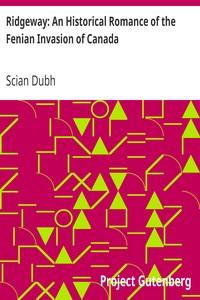Read this ebook for free! No credit card needed, absolutely nothing to pay.
Words: 94187 in 13 pages
This is an ebook sharing website. You can read the uploaded ebooks for free here. No credit cards needed, nothing to pay. If you want to own a digital copy of the ebook, or want to read offline with your favorite ebook-reader, then you can choose to buy and download the ebook.


: Ridgeway: An Historical Romance of the Fenian Invasion of Canada by Dubh Scian - Ridgeway Battle of Ridgeway Ont. 1866 Fiction; Fenians History Fiction; Canada History Fenian invasions 1866-1870 Fiction
RIDGEWAY
AN HISTORICAL ROMANCE OF THE FENIAN INVASION OF CANADA
"On our side is virtue and Erin; On theirs' is the Saxon and guilt."--MOORE.
INTRODUCTION.
In the dark, English crucible of seven hundred years of famine, fire and sword, the children of Ireland have been tested to an intensity unknown to the annals of any other people. From the days of the second Henry down to those of the last of the Georges, every device that human ingenuity could encompass or the most diabolical spirit entertain, was brought to bear upon them, not only with a view to insuring their speedy degradation, but with the further design of accomplishing ultimately the utter extinction of their race. Yet notwithstanding that confiscation, exile and death, have been their bitter portion for ages--notwithstanding that their altars, their literature and their flag have been trampled in the dust, beneath the iron heel of the invader, the pure, crimson ore of their nationality and patriotism still flashes and scintillates before the world; while the fierce heart of "Brien of the Cow Tax," bounding in each and every of them as of yore, yearns for yet another Clontarf, when hoarse with the pent-up vengeance of centuries, they shall burst like unlaired tigers upon their ancient, and implacable enemy, and, with one, long, wild cry, hurl her bloody and broken from their shores forever.
Had not Ireland, at the time of the invasion, been cut up through the fierce pride and petty jealousies of her rulers, the English could never have effected a permanent footing upon her shores. Contemptible in numbers, shipping and appointments, the concentrated opposition of even a few petty chiefs could have scattered them to the winds, or sent them "howling to their gods". But, wanting in that homogeneity without which a nation must always remain powerless, the invasion of the territory of one individual ruler was often regarded as a matter of no very grave importance to those who were not his immediate subjects; so that from this cause, as well as from, the unhappy dissentions which harrassed the country at the period, the new colony found the means of establishing themselves upon the eastern borders of the island, and of possessing themselves of some of the walled towns, which they subsequently turned to such good account in fortifying themselves against surprise and baffling the pursuit of the natives, when worsted in the open field.
Whether the subtle influences of a common nationality moved Pope Adrian the Fourth--who was an Englishman named Nicholas Breakspear,--to issue the famous Bull granting Ireland to his fellow countryman, Henry the Second of England, or whether, as it has been alleged, no such Bull was ever issued, and that the one still extant is a forgery, it matters but little now. The Pope's claims extended to the spiritual jurisdiction of Ireland only; and even had he granted the Bull in question, and assumed the right of conveying the whole island to the English king, the transfer was obtained under false pretenses for, from the very wording of the document itself, it is palpable that Henry led the Sovereign Pontiff, to believe that Ireland was sunk in the grossest ignorance and superstition, and that, in making a descent upon it, he had only the glory and honor of the Church in view. So terrible a distortion of the facts of the case on his part, necessarily rendered all action based upon his statement morally invalid at least; and thus it is, that even those who have confidence in the genuineness of this Bull, regard it as utterly worthless, and at not all admissable into any pleadings which ingenious English politicians may choose to advance on the subject.
This foul and dastardly system of assassination was but simply a leading expression of the bastard nationality of the invader. Not one, single drop of proud, pure blood coursed through his veins. His degraded country had been in turn the mistress of the Roman, the Saxon, the Dane and the Norman, and he was the hybrid offspring of her incontinence. Consequently, he had neither a history nor a past of his own, calculated to prompt even one exalted aspiration. He was a mongrel of the most inveterate character, and was therefore, and inevitably, treacherous, cowardly; and cunning. Not so the brave sons of the land he so ardently coveted. Ere the mighty gnomon of "The Great Pyramid" had thrown its gigantic shadow o'er the red dial of the desert, they had filled the long gallery of a glorious past with an array of portraits, the most superb presented by antiquity. Before the Vocal Memnon poured forth his hidden melody at sunrise, or "The City of a Hundred Gates" had sent forth her chariots to battle, they had a local habitation and a name, and had stamped their impress upon many a shore. No people in existence, to-day, can look back to an origin more remote or clearly traceable through a countless lapse of ages than the Irish: and hence it was, that at the period of the Anglo-Norman descent upon their borders, the chivalry of a stupendous past was upon them: and having its traditions and its glories to maintain and emulate, and being, besides, inspired by the pure and unadulterated crimson tide that had flowed in one uninterrupted stream through their fiery veins for the space of two thousand years previously, they shrank from the treacherous and dastardly system of assassination introduced by the ignoble and cowardly Saxon, and struck only to the dread music of their own war cry.
Still, although in detail hostile to the invader, no great, united effort appears to have been made to rout him out root and branch, until he had become so powerful as to make any attack upon him a matter of the most serious moment, and had, in addition, enlarged his borders through sundry reinforcements from his own shores. The few more purely Norman leaders that were inspired with some desire at least for a more honorable mode of warfare, were utterly powerless among the overwhelming throng of their followers who had been long brutalized on the other side of the channel. In this connection the proud, revengeful and chivalrous natives were had at a sad disadvantage; for then, as to-day, they were characterized by a spirit of knight-errantry, which disdained to take an enemy unawares.
As an evidence that Henry had the spiritual welfare only of the people of Ireland at heart, and that the building up of the Church there was his sole object, no sooner did he land in that country, than he parcelled out the entire island among ten Englishmen--Earl Strongbow, Robert Fitzstephens, Miles de Cogan, Philip Bruce, Sir Hugh de Lacy, Sir John de Courcy, William Burk Fitz Andelm, Sir Thomas de Clare, Otho de Grandison and Robert le Poer. At one sweep, in so far as a royal grant could go, he confiscated every foot of land from Cape Clear to the Giant's Causeway, denied the right of the inhabitants to a single square yard of their native soil, and made the whole country a present to the persons just named. Perhaps history does not record another such outrageous and infamous act, and one so antagonistic to every principle of right and justice. Had there been a preceding series of expensive and bloody wars between both countries, in which Ireland, after years of fruitless resistance, fell at last beneath the yoke of the conqueror, it could be readily understood, that the victor would seek to indemnify himself for his losses, on terms the most exacting and relentless if you will; but in the case under consideration, no animosity existed between the two nations until the ruler of one, without even a shadow of provocation on the part of the inhabitants of the other, made a deliberate descent upon them, and ignoring the benefits conferred gratuitously by them, previously, on his own ungrateful land, subjected them to every barbarity and wrong known to the history of crime.
For upwards of four hundred years of the English occupation--that is, from the landing of Strongbow down to the period of James the First, there was no legal redress for the plunder or murder of an Irishman, by any of the invaders, or for the violation of his wife or daughter. The laws of the Pale, enacted under the sanction of the King and the people of England, subsidized, in effect, a horde of ruthless assassins and robbers, with a view to striking terror to the hearts of the natives, and driving them into a recognition of the right of the usurper to rule over them, and dispose as he saw fit of their property and persons. This right, however, was never conceded in even the most remote degree; for, notwithstanding that the colony of foreign spears and battle-axes waxed stronger daily, the Irish element, disunited though it was, fought it constantly. True, that an occasional lull characterized the tempest as it swept and eddied through each successive generation; but never did Ireland assume the yoke of the oppressor voluntarily, or bow, for even a single moment, in meek submission to his unauthorized sway.
It would require volumes to recount a tithe of the frightful atrocities practiced by the invaders upon the rightful and unoffending owners of the soil during the long period just referred to, and especially towards its close, when that lewd monster, Elizabeth, disgraced her sex and the age. No language can describe adequately the various diabolical modes of extermination practiced against all those who refused to bow the knee and kiss the English rod. No code of laws ever enacted in even the most barbarous age of the world, could compare in fiendish cruelty with the early penal enactments of the Pale--so forcibly supplemented in after years by the perjured "Dutch boor" and the inhuman Georges. The foul fiend himself could not have devised laws more diabolical in their character or destructive in their application. So close were their meshes and sweeping their folds, that the possibility of escape was obviously out of the question; as their victim was met and entangled at every turn, until at last the fatal blow descended, and the unequal contest was ended. But more infamous and unjustifiable still, when "the foul invader" found himself occasionally unable to cope successfully with his brave and chivalrous antagonists, he had recourse to a darker and deeper treachery than even that which characterized the stealthy and unexpected stroke of his midnight dagger. He adopted the guise of friendship; and professing to forget the past, lured into his power with festive blandishments the chiefs of many a noble following, whom he dared not meet in open fight, but who, at a given signal, and while the brimming goblet circled through the feast, were suddenly set upon and foully murdered ere they could draw a dagger or leap to their feet. In corroboration of this assertion, we have only to refer to Mullaghmast, where a deed of this description was perpetrated; and of a character so cruel and dastardly, that the names of those concerned in the inhuman plot are now desecrated by every individual raised above the brute, or inspired with the hope of heaven.
Free books android app tbrJar TBR JAR Read Free books online gutenberg
More posts by @FreeBooks

: Cameos from English History from Rollo to Edward II by Yonge Charlotte M Charlotte Mary - Great Britain History Anecdotes


: The Knights of the Cross or Krzyzacy: Historical Romance by Sienkiewicz Henryk Binion Samuel Augustus Translator - Teutonic Knights History Fiction; Poland History Jagellons 1386-1572 Fiction






